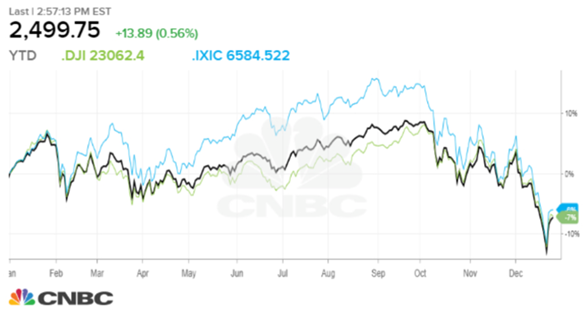Allworth CEO Scott Hanson shares why it's important to stay invested, even as the stock market turbulence continues.
I received a call this week that I haven’t stopped thinking about.
While the call was an appointment with my client, Darrell (and therefore expected), it’s what he said when I first picked up the phone that has stayed on my mind.
When I answered, Darrell began—not with a standard greeting, mind you—but instead jumped right in with:
“Scott, I know that I should stay invested. And I know that you know that I should stay invested. But I just want to hear you tell me that I should stay invested.”
We both laughed for a moment, which, I’ll admit, in the midst of everything we are all going through, felt surprisingly good.
I don’t frankly know where the markets will be next week. And I don’t know where the markets will be in a month. (No one does.) Nor in a year. (Same thing.)
Yet, based on my knowledge of market history, my nearly 30 years of experience, and my having guided clients (and a growing firm) through four financial crises, I’m very confident about what markets will do in the future.
And you should be, too.
In that sense, one essential goal for everyone who saves and invests is to simply get through this. This moment. This time. This downturn.
To persevere and manage our anxieties today.
Financially, above all else, getting through today means avoiding emotion so you stay in position to benefit when the next bull market starts.
Because when the fog and uncertainty lift—and they will lift—it remains my experience that the people who reach their financial goals are usually the same people who manage their anxieties and stick with their plan.
Turbulence is scary. Turbulence is normal. (And many vacations are bracketed by it.)
Most of you have experienced the terror of a rough flight.
When that plane is jumping around, it’s horrible. Structurally, you can’t believe it will hold together, and moments like that can undermine your will to travel.
But, eventually, you land in Hawaii, or Mexico, or Europe, and you forget all about that flight.
Why? Because the plane held together (as deep down you knew it would), and the pilot got you to your destination (as deep down you knew he or she would).
The most common reason for turbulence during a flight is merely air streams in the atmosphere. Air is like water, and there are currents of air up in the sky (just as there are water currents in the ocean). The jet is going incredibly fast, and it hits those invisible currents, and so the plane suddenly rises and falls and increases and decreases in speed.
Turbulence is normal. In fact, those of you who fly a lot should expect it.
What’s abnormal is a flight without any turbulence.
Which makes the seamless, silky smooth and uninterrupted 11-year bull market we just finished all-the-more extraordinary.
But were the past 11 years really all that smooth? Or, is that just what we remember?
You may have forgotten about all that rough air from the end of 2018.
In the last quarter of 2018 (Oct-Dec 31st), the S&P fell almost 14%, the Dow about 12%, and the Nasdaq 17.5%.
Major averages in 2018


Now, to be sure, the above turbulence wasn’t quite as bumpy as the flight we are on right now, but then, our most recent bull market was, in a sense, a very long holiday bracketed by periods of typically rough air.
Cash is not king.
Nobody enjoys losing money. But, sometimes, when the market hits a rough patch, people get so worried that they consider selling their investments to “move” to cash.
That’s understandable, but here is why that’s usually a terrible idea.
First, you lock in your losses.
People tend to sell when the market falls, after they’ve incurred a loss. But if you’re an investor and you regularly check the market, or, say, the balances of your retirement account(s), and you see a decline?
Hard as it is to accept, it’s meaningless.
Yes, your balances are down on paper, but your losses are not realized unless you sell.
If you don’t sell, the fact is, the only thing that’s down is the price.
Second, current inflation, at roughly 2%, is higher than the interest paid on savings or money market accounts. People who move to cash now are not only locking in losses, they’ll be swimming upstream as inflation eats away at the value of their money.
(Quick fact: $1 invested in the S&P 500 in 1927 would now be worth over $7,000, whereas $1 invested that same year in Treasury bills would now be worth about $21.00.) 1
Stick to your plan. (And if you don’t have a plan, now’s a great time to create one.)
When you team with a good advisor (principled, credentialed, experienced and educated), you typically do so to help you manage, first, your savings and investments, but, second, to help you develop a long-term financial plan that impacts your budgeting, approach to Social Security, income sources, taxes, debt, estate plan and, inevitably, your transition into and through retirement.
All of that is valuable in ways you should be able to quantify but also “sense.” Simply, what is the emotional value of ongoing financial guidance, and feeling prosperous, confident, and part of a team?
Which brings me back to this week’s call with Darrell.
What was so gratifying about the call, is that after years of working together he knows himself well enough to be able to tell me what financial guidance he needs during a downturn.
1 https://www.thestreet.com/investing/why-investors-should-stay-in-the-market
Give yourself an advantage. Sign up to receive monthly insights from our Chief Investment Officer, and be the first to know about upcoming educational webinars. You'll also get instant access to our retirement planning checklist.
 November 19, 2025
When Timing Goes Wrong: What HNW Investors Need to Know About Sequence of Returns Risk
November 19, 2025
When Timing Goes Wrong: What HNW Investors Need to Know About Sequence of Returns Risk
Even well-constructed wealth plans can be vulnerable to market timing. Here’s how high-net-worth investors can better insulate their retirement from …
Read Now September 23, 2025
The Mirage of Complexity: Is Your Portfolio Diversified… or Just Overengineered?
September 23, 2025
The Mirage of Complexity: Is Your Portfolio Diversified… or Just Overengineered?
Your investments might look and feel like they’re diversified. But what happens when you look under the hood?
Read Now June 26, 2025
8 Wealth Preservation Strategies for High-Net-Worth Investors
June 26, 2025
8 Wealth Preservation Strategies for High-Net-Worth Investors
In unpredictable markets, protecting your wealth requires more than caution—it demands a sophisticated, strategic approach. Here are eight ways to …
Read Now
